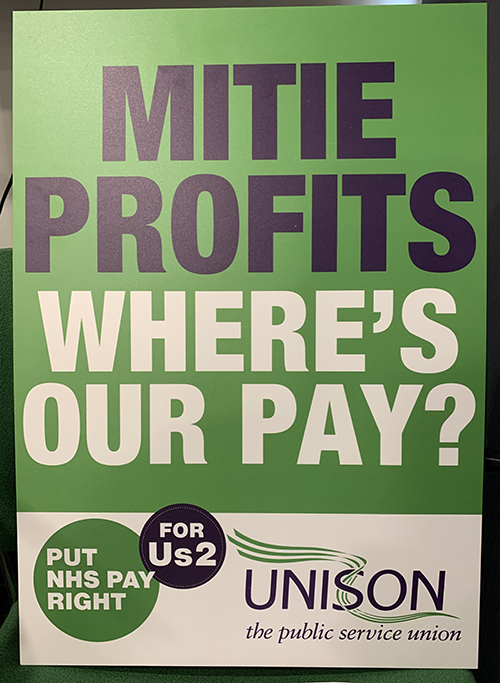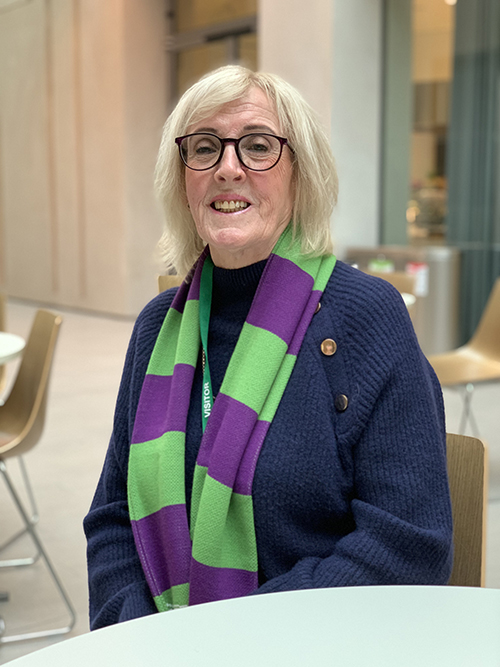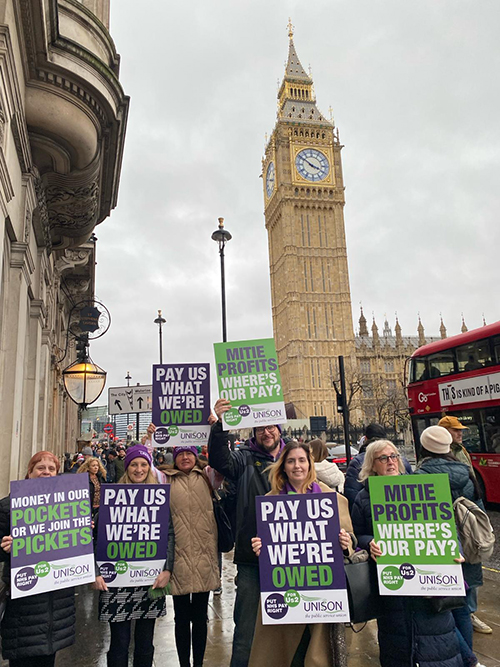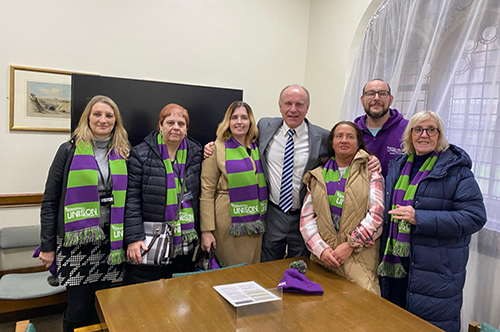It’s a classic case of David v Goliath, with part-time hospital cleaner ‘Dudley Denise’ facing up to Mitie CEO ‘Miami Phil’. But in Denise’s corner, she and her colleagues have UNISON.
And when a group of them visited UNISON Centre on Wednesday, general secretary Christina McAnea (pictured above) made sure they knew the union is proud of them and that they’ll get all the support they need.
The members, who are employed by private contractor Mitie at Russells Hall Hospital in Dudley, walked out on their first day of strike action at 5am this morning (Friday), along with colleagues in UNITE.
The company continues to refuse to pay a COVID bonus payment that the government agreed last year as part of a wider settlement to the NHS dispute.
This is despite Mitie being signed up to Agenda for Change, which means members of the NHS workforce that it employs should not be treated differently to those employed directly by the service.
The bonus would be worth around £1,600 for the lowest-paid staff.
There’s long been a perception among some people that non-medical staff in the health service are not as ‘important’ as the medical staff. But as was crystal clear from a round-table conversation with Christina, the health service cannot run without them.

From porters to cleaners, from cooks to switchboard operators and those providing sterile services, not only are they key workers in the NHS, they were key workers throughout the pandemic – and their experiences of that were no different to those of medical staff.
The group spoke of porters not seeing newborn family members for months because of the risk of passing on the virus; of cleaners following trolleys taking the COVID dead to the hospital morgue, cleaning as they went.
They recalled the double-figure queues of ambulances waiting outside the same morgue, along with the colleagues they themselves lost. And of course, there was a lack of PPE.
“When it was over, we were given a certificate and a badge,” says Rich. “But it will live with us for the rest of our lives.”
Linda adds: “It’s not about the money. It’s about the recognition for what we did during COVID.”
As employees, they have received emails telling them that the company couldn’t afford to pay the bonus. As “token shareholders” in Mitie, they have also received emails telling them that the company was making “record profits”.
Last November, Mitie announced mighty half-year profits of £28m (up 24%) and has forecast a full-year profit of £190m.
The company handed boss Phil Bentley a reported pay packet of £5.9m, with a bonus of £980,000. The bonus alone is more than the sum that Mitie itself calculates would be needed to pay the staff their deserved bonuses.
Mr Bentley formerly ran Cable and Wireless in Florida and he has been dubbed ‘Miami Phil’ by the strikers.
There’s no record of whether he came up against any Miami vice during his sojourn in the Sunshine State, but here, he’s up against ‘Dudley Denise’, a UNISON steward with over 37 years of experience working at Russells Hall (pictured below).

“I went there as a young girl – and I’ve done everything there,” she explains. “I did 22 years as a porter; I’ve done supervising there – I was a supervisor for 14 years.
“And then I lost my husband and I moved onto mornings – I’d always worked evenings because of the children. And now I’m cleaning where all the managers are,” she adds with a chuckle.
The group had told Christina that they were “like a family”. Does Denise think that is why they’re so together in this dispute?
“I think we’ve all been there so many years, from young girls – in our sixties now! Some of my friends have lost their husbands or divorced, but we’ve always kept our ties. We’ve always done Christmas parties, birthday parties; we’ve always had that closeness – we just get on great.”

Rich (above) has been a porter at the hospital for over 16 years. He’s currently the Mitie lead steward and chair of the Dudley group for UNISON.
“I think it’s because of our shared experiences during COVID – and over the last 10, 15 years. It’s like a family of us at the hospital. I’ve been to weddings, funerals; we’ve been to baptisms. We go out drinking together, we go out partying together – we celebrate everything together.”
But Rich thinks the bonus is the straw that’s broken the camel’s back.
“I think it’s just the fact of … we’ve just had enough now. Since Mitie have come in, things have been … shall we say, not so good. They’ve tried to make a lot of changes which they say are for the better, but we know they’re not. They’re just doing things to line their own pockets, basically, and forgetting about the workers.
“The whole £1,600 COVID payment has just unified people even more, to be fair.”
After lunch at UNISON Centre, the group visited Mitie HQ at the Shard, before going on to Parliament, where they met Marco Longhi, the Conservative MP for Dudley North, who told the group that he supported them and that the issue was one of fairness.

Taking the fight to Westminster
He has already written to Victoria Atkins, the secretary of state for health and social care, to ask that the response to private employers that have applied to the government for funding to pay the bonus – including Mitie – is speeded up.

With Marco Longhi MP
Mr Longhi also agreed to write to Mitie’s CEO focusing on reputational damage – and he added that his personal view is that Mitie should really be paying the money out of the company’s own funds.
From Westminster, it was back to Dudley. Regional organiser Ollie Hopkins said the group were “feeling so positive and energised. They all got so much out of the day and really felt enthused by seeing the full support from the union that they have”.
And who’d bet against ‘Dudley Denise’ and her colleagues in their fight with ‘Miami Phil’ and his corporate Goliath?
The article The NHS workers in a Mitie fight for fair pay first appeared on the UNISON National site.